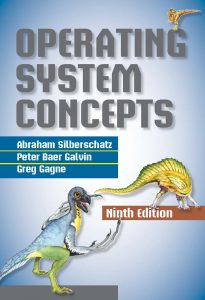COP-4610 Operating Systems Principles
(Fall 2017)
General Information
Meeting Time and Place:
- Lectures: Tue/Thu 6:25PM – 7:40PM, ECS 135
- Labs: Tue 3:30PM – 4:45PM (U02), Wed 3:00PM – 4:15PM (U01), ECS 141
Instructor: Jason Liu
- Office: ECS 363
- Email: liux@cis.fiu.edu
- Phone: 305-348-1625
- Web: http://www.cis.fiu.edu/~liux/
Office Hours (subject to change):
- Tue 5:00PM – 6:00PM, Thu 2:00PM -6:00 PM
- Students are welcome to stop by and ask questions as long as the instructor is available at the time. Office hours are designated time for students and you can also make an appointment before coming to the office hour in order to guarantee more exclusive access.
Teaching Assistants:
- Pinchao Liu
- Office: ECS 265
- Email: pliu002@fiu.edu
- Phone: 786-607-0688
- Mary Aghili
- Office: EC (Engineering Center) 2220
- Email: maghi001@fiu.edu
- Phone: 786-567-1572
Course Information
Course Description:
Operating systems design principles and implementation techniques. Address spaces, system call interface, process/threads, interprocess communication, deadlock, scheduling, memory, virtual memory, I/O, file systems.
Learning Outcomes:
- Master the functions and structures of operating systems
- Be familiar with issues in the design of operating systems
- Master techniques of memory management
- Master file and storage systems
- Master concepts of process synchronization and communication
Major Topics:
- Processes
- Threads
- CPU Scheduling
- Process synchronization
- Memory management
- Virtual memory
- File systems
- IO systems
Course Moodle:
We use Moodle (https://moodle.cis.fiu.edu/v3.1/course/view.php?id=1603) for disseminating information and collect homework assignments. The grades will also be put on moodle as well.
Tentative Course Schedule:
The overall schedule of this course is provided at: https://people.cis.fiu.edu/liux/teaching/cop-4610-operating-system-principles-fall-2017-course-schedule/. The schedule is tentative and can only be used as a reference. Your instructor reserves the right to make changes to the schedule during the course.
Prerequisites:
- CDA-4101: Structured Computer Organization (levels of organization in a computer: design of memory, buses, ALU, CPU; and design of microprogram)
- COP 4338: Computer Programming III (programming in C and advanced programming in Unix environments, including multiprocessing and multithreading)
Textbook

Operating System Concepts
9th Edition
- Avi Silberschatz
- Peter Baer Galvin
- Greg Gagne
John Wiley & Sons, Inc.
ISBN 978-1-118-06333-0
The book’s official website (os-book.com) contains lecture slides, review questions, solution to practice exercises. Here’s the book’s publisher site (where you can find purchase options).
Recommended Reading:
-
Operating Systems: Three Easy Pieces, by Remzi H. Arpaci-Dusseau and Andrea C. Arpaci-Dusseau. Nothing beats a free online book. This he book covers all the necessary topics of this course.
- Learn C The Hard Way, by Zed A. Shaw. If you need to brush upon the C, language, this book is a good option as it has a good coverage of the language. The book used to be free but is no longer.
- Advanced Programming in the UNIX Environment, by W. Richard Stevens and Stephen A. Rago. Recommended for any serious Unix programmer.
Evaluation
- Homework (expected five assignments): 50%
- Midterm Exam: 20%
- Final Exam: 30%
Letter grades will be assigned based on overall percentage. The scale is as follows: A is 90% or higher, B is 80% or higher, and C is 70% or higher. + or – is done at 3.33% intervals, so A- is 86.67% or higher, B+ is 83.33%, etc. C- is 66.67% or higher.
Policy
- Class attendance:
The students are required to attend the lectures and labs. In general, materials covered in the classes and labs will not be repeated outside the class to any specific students who are absent, although special arrangements can be made upon requests and with the instructor’s approval.
- Make-up exams:
There will be no make-up exams.
- Homework assignments:
Late submission for assignments will be accepted with grade deduction. The calculation of the grade deduction is as follows. If submitted within 24 hours of the deadline, 15%; if submitted between 24 and 48 hours, 30%; if submitted between 48 and 72 hours, 50%. Assignments will not be accepted if they are submitted beyond 72 hours (that is, 100% deduction). For example, if the assignment is submitted late for two days, and if the grade for the assignment is 90 before the penalty, the final grade for the assignment will be 90*(1-30%)=63.
Exceptions include legitimate, verifiable cases of illness or emergency, and observation of religious holy days. ALL EXCEPTIONS MUST BE APPROVED WITH WRITTEN NOTICE BY THE INSTRUCTOR IN ADVANCE BEFORE THE ASSIGNMENT’S DEADLINE.
- Communication with instructor:
You are welcome to stop by the instructor’s office at any time when you find him available. The chance is better during the office hours (see above). In any case, it’s better to make an appointment with the instructor beforehand in order to secure a dedicated slot for you.
The most convenient way to reach the instructor is through email. Given the large number of students in class, PLEASE SPELL OUT YOUR NAME AND PANTHER ID IN YOUR EMAIL WHEN COMMUNICATING WITH THE INSTRUCTOR.
- Academic conduct:
Florida International University is a community dedicated to generating and imparting knowledge through excellent teaching and research, the rigorous and respectful exchange of ideas, and community service. All students should respect the right of others to have an equitable opportunity to learn and honestly demonstrate the quality of their learning. Therefore, all students are expected to adhere to a standard of academic conduct, which demonstrates respect for themselves, their fellow students, and the educational mission of the University. All students are deemed by the University to understand that if they are found responsible for academic misconduct, they will be subject to the Academic Misconduct procedures and sanctions, as outlined in the Student Handbook.